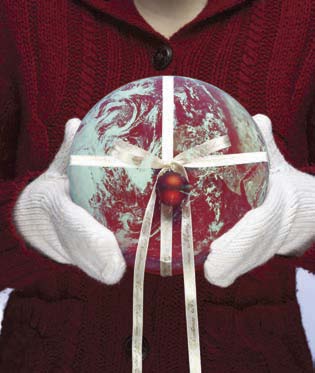Celebrate Christmas while helping the planet and your finances!
by Davie Philip
 Christmas is a time for celebration, giving and spending time with family and friends. For most it is a positive time, but it can also be a time of stress and overspending in the lead up to the big day, searching for appropriate gifts for our loved ones. Persuaded by the thousands of TV ads each year we buy more and more things to throw away and gobble up energy.
Christmas is a time for celebration, giving and spending time with family and friends. For most it is a positive time, but it can also be a time of stress and overspending in the lead up to the big day, searching for appropriate gifts for our loved ones. Persuaded by the thousands of TV ads each year we buy more and more things to throw away and gobble up energy.
Christmas has become vital to the economy. Shop sales increase dramatically during the season as we purchase gifts, decorations, and supplies for the annual binge. The commercialisation of the festive season fuels consumerism and has become a time of recklessly high fossil fuel consumption.
Decorating homes with thousands of lights and plastic Santas to celebrate Christmas has become a high energy Christmas activity. Yet, any reminders of the festive season’s contribution to climate change and its impact on the planet are quite likely to be dismissed as the musings of the Christmas-hating Ebenezer Scrooge. ‘Bah humbug!’
However, scientists are now warning that we could soon be having a ‘green Christmas’ because of the dramatic effects of climate change. Trees that used to shed their leaves in autumn are now often still in leaf in mid-December. Experts say it is only a matter of time before foliage remains until the end of the month. Of course that is not the green Christmas we need.
Your Christmas gift to the planet could be cutting energy use and reducing consumption. But how do we keep our Christmas carbon footprints small? Here are a few tips to have a greener Christmas:
- Part of the joy of Christmas is the light’s which brighten our homes. The good news is there are plenty of way to reduce the amount of energy you use and carbon dioxide generated while still decorating your home with Christmas lights.
- Switching from conventional Christmas lights to LED lights will reduce your energy consumption by 90%, and because they don’t generate as much heat you could also be safer. A fibre optic decoration can light a whole tree from a single bulb, and is just as effective as a whole string of Christmas tree lights
- Turning one or more room lights off when you switch on your Christmas lights will make them look more attractive – and save energy. Try to only use your Christmas lights at night and when you are at home
- There are plenty of alternatives to plastic decorations and tinsel. Instead of using artificial Christmas decorations and lights, hang greenery from the garden or organic seasonal fruit that can be composted when the decorations come down.
- We dump millions of dead Christmas trees each year. Trees pump out oxygen and soak up CO2 so this isn’t such a good idea. As an alternative you could decorate houseplants or look around outdoors for fallen cones and branches to transform your home into a festive wonderland. If you can’t do without a tree consider a living one and plant it after the festive season.
- Christmas is an ideal opportunity to catch up with friends and people we haven’t had a chance to see for ages. If you know someone who may be on their own at Christmas, invite them along to enjoy your celebrations.
- Billions of Christmas presents are exchanged every year. Consider the impact on the environment the gifts you give. Think about what you are buying, where and how was it made, and is it really wanted? Gifts that help someone else live more sustainably, such as books or seedlings for a veggie patch are always a good idea.
- Keep the emphasis on presence not presents. The gift of time is always a great alternative; consider gifting tickets to a concert or a conference or vouchers for a massage.
- Many charities and environmental organisations offer gift services which not only solve the problem of the gift for the person who has everything, but also help others or the environment for years to come. You can buy a goat for a family in Bangladesh or organise for trees to be planted to offset the emissions from someone’s car for a year.
- To cut down on waste, you could wrap your presents in recycled paper, children’s drawings and paintings, or even glossy magazine paper. You could also save and reuse wrapping paper from gifts you receive. Using ribbon or string to wrap presents makes it easier for the wrapping paper to be reused.
- When planning your Christmas dinner think food miles and buy locally-grown, seasonal and organic produce. Buying local produce helps the local economy and is better for the environment because the produce hasn’t needed to be transported long distances in planes, ships or trucks to get to you. Also look for a ‘Fair Trade’ label on the produce you can’t source locally.
For more info www.cultivate.ie

![pl_full_web_page_28_image_0001[1]](https://www.positivelife.ie/dev/wp-content/uploads/2009/03/pl_full_web_page_28_image_00011.jpg)
